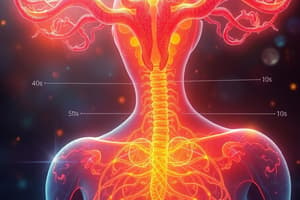Podcast
Questions and Answers
Which hormone plays a crucial role in regulating appetite?
Which hormone plays a crucial role in regulating appetite?
- Leptin (correct)
- Testosterone
- Progesterone
- Estrogen
Which hormone is responsible for controlling water balance?
Which hormone is responsible for controlling water balance?
- Cortisol
- Aldosterone
- Vasopressin (correct)
- Testosterone
Which hormone is involved in regulating blood pressure and stress response?
Which hormone is involved in regulating blood pressure and stress response?
- Leptin
- Ghrelin
- Progesterone
- Cortisol (correct)
Which type of hormone includes insulin, glucagon, growth hormone, and oxytocin?
Which type of hormone includes insulin, glucagon, growth hormone, and oxytocin?
Where can receptors for hormones be found in target cells?
Where can receptors for hormones be found in target cells?
Which gland is responsible for controlling blood sugar levels?
Which gland is responsible for controlling blood sugar levels?
How do hormones primarily regulate physiological functions in the body?
How do hormones primarily regulate physiological functions in the body?
Which gland is considered the major endocrine gland in the brain?
Which gland is considered the major endocrine gland in the brain?
Which gland is responsible for regulating circadian rhythms?
Which gland is responsible for regulating circadian rhythms?
Which hormones are secreted by the adrenal glands to help regulate blood pressure and the stress response?
Which hormones are secreted by the adrenal glands to help regulate blood pressure and the stress response?
Which hormones are produced by the thyroid gland to regulate metabolism?
Which hormones are produced by the thyroid gland to regulate metabolism?
What is the primary stress hormone secreted by the adrenal cortex in response to ACTH stimulation?
What is the primary stress hormone secreted by the adrenal cortex in response to ACTH stimulation?
Which hormone stimulates the pituitary gland to release ACTH in the stress response pathway?
Which hormone stimulates the pituitary gland to release ACTH in the stress response pathway?
What is the main hormone that regulates blood sugar levels and is secreted by the pancreas?
What is the main hormone that regulates blood sugar levels and is secreted by the pancreas?
Which hormone system is responsible for regulating blood pressure through the secretion of renin, angiotensin, and aldosterone?
Which hormone system is responsible for regulating blood pressure through the secretion of renin, angiotensin, and aldosterone?
Flashcards are hidden until you start studying
Study Notes
Chemical Coordination and Integration: Focus on Hormones and the Endocrine System
Hormones are chemical messengers that regulate the physiological functions in our bodies. They work in conjunction with the neural system to maintain homeostasis, growth, and development. The endocrine system, consisting of various glands, produces these crucial hormones.
The Endocrine Glands
The human endocrine system, composed of 8 major glands, includes:
- Hypothalamus
- Pituitary
- Pineal
- Thyroid
- Parathyroid
- Adrenal
- Pancreas
- Gonads (testes and ovaries)
Other organs, such as the gastrointestinal tract, kidney, and heart also produce hormones.
Hormone Classification
Hormones can be broadly categorized into:
- Peptide, polypeptide, and protein hormones: Insulin, glucagon, growth hormone, and oxytocin
- Steroid hormones: Cortisol, testosterone, and estrogen
- Amino-acid derivatives: Epinephrine and norepinephrine
Hormone Action
Hormones act by binding to specific receptors on target cells. These receptors can be found in the cell membrane or within the nucleus. Once bound, hormones initiate a series of cellular events, including the formation of second messengers and altering gene expression.
Hormones and the Endocrine System: Key Functions
- Regulating metabolism: Thyroid hormones stimulate basal metabolic rate, while insulin controls blood sugar levels.
- Growth and development: Growth hormone and sex hormones (estrogens, progesterone, and testosterone) influence growth, maturation, and sexual development.
- Controlling hunger and thirst: Hormones such as leptin and ghrelin regulate appetite, while vasopressin (antidiuretic hormone) helps control water balance.
- Initiating sexual development and reproduction: Gonadal hormones, including estrogen, progesterone, and testosterone, play crucial roles in sexual development and reproduction.
- Maintaining homeostasis: Hormones like aldosterone regulate electrolyte balance, while cortisol and adrenaline help the body respond to stress and regulate blood pressure.
In summary, hormones and the endocrine system work in concert to regulate various physiological functions, ensuring homeostasis and proper growth and development within the body. Understanding the roles and functions of these hormones is essential in appreciating the complex interplay of chemical coordination and integration in humans.
Studying That Suits You
Use AI to generate personalized quizzes and flashcards to suit your learning preferences.




